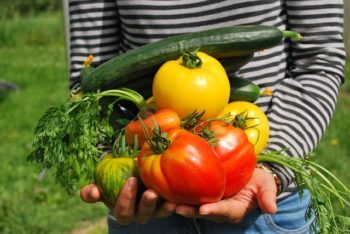Colloquial Spanish Course – Talking about plants in Spanish Posted by Laura & Adam on Nov 23, 2020 in Learning, Spanish Culture, Spanish Grammar, Spanish Vocabulary
In this Spanish lesson we are going to practice talking about plants in Spanish. First we will learn some relevant grammar and vocabulary and then see if you can follow a short audio conversation in Spanish. The transcript to the audio will be given at the end of the post but please try not to look at it until you have tried playing and understanding the audio a few times.
Talking about plants in Spanish:
Cosechar: to harvest
Cultivar: to grow
El abono: compost
El árbol: tree
El arbusto: bush
El bosque: forest
El bulbo: bulb
El capullo: bud
El césped: lawn
El huerto: allotment, plot
El jardín: garden
El pétalo: petal
El polen: polen
El seto: hedgerow
El tallo: stem
Germinar: to germinate
La espina: thorn
La flor: flower
La fruta: fruit
La hierba: grass
La hierba aromática: herb
La hoja: leaf
La maceta: plant pot
El fruto seco: nut
La planta: plant
La raíz: root
La tierra: soil
La vid: vine
Las herramientas: tools
Las plántulas: seedlings
Las semillas: seeds
Las verduras: vegetables
Los hierbajos: weeds
Plantar: to plant
Sembrar: to sow
Now play the audio to listen a conversation. Can you understand what is being said? Play the audio a few times before you look at the transcript. Don’t worry if you don’t understand every single thing the two people are saying. Try to catch whichever words you can and then try to piece things together to work out what is being said.
(Play the audio a few times before you scroll down and look at the transcript)
Transcript:
Maite: Hola Jonathan. ¡Guauu! ¡Tu jardín está increíble! Has estado trabajando duro, ¿eh?
Jonathan: Sí. He estado en el jardín todos los días durante el mes.
Maite: ¿Y eso por qué?
Jonathan: He decidido que no quiero comprar más comida del supermercado.
Maite: Quieres ser autosuficiente.
Jonathan: ¡Voy a ser autosuficiente! Estoy decidido.
Maite: Pues yo no tengo tiempo para este tipo de cosas.
Jonathan: Yo tampoco. Pero si realmente quieres hacer algo, encuentras la manera.
Maite: Mi jardín es un desastre.
Jonathan: Solo porque no lo cuidas Maite. Mi jardín era una jungla de malas hierbas hace cinco semanas.
Maite: Me encantan las plantas. Especialmente las flores. Pero no sé nada sobre cómo cultivarlas. Mataré todo lo que intente cultivar, fijo.
Jonathan: No soy un experto. Solo uso información en Internet. Vídeos de Youtube y grupos de Facebook. No necesitas saber nada. Solo seguir las instrucciones.
Maite: La verdad es que me gusta mi césped.
Jonathan: El césped es una pérdida de espacio. Es mucho mejor cultivar vegetales.
Maite: No lo sé. Tal vez. ¿Es fácil cultivar frutas?
Jonathan: La fruta es lo más fácil de cultivar. Planta algunos arbustos y árboles y espera a que tengan fruto.
Maite: ¿Y los frutos secos?
Jonathan: Son fáciles también. Solo necesitas espacio para los árboles.
Maite: Tengo un jardín muy grande. Tal vez plante árboles frutales y de frutos secos.
Jonathan: ¡Venga hazlo! Las hierbas aromáticas son muy simples de plantar y cultivar también. Y plantar flores también.
Maite: Me imagino que las verduras son más complicadas y requieren más tiempo.
Jonathan: En general, sí. ¡Pero tenemos que dejar de comprar verduras importadas que no son ecológicas y cubiertas de plástico!
Maite: Bien por ti Jonathan. Tal vez te pueda comprar a ti las verduras en el futuro.
So, how did you get on? How much did you understand of the listening? Please let me know in the comments section below…
Don’t worry if you didn’t understand that much, keep reviewing the vocabulary and phrases and you will soon be up to speed and ready for the next lesson in this course. See you next time!

Build vocabulary, practice pronunciation, and more with Transparent Language Online. Available anytime, anywhere, on any device.





Comments:
Garry Montgomery:
there seems to be something wrong with the sentence: tal vez te pueda comprar a ti las verduras.
Maybe: tal vez pueda comprar las vegetables de ti?
Laura:
@Garry Montgomery Hola Garry, thanks for your comment. The original sentence is correct, but I can see why you might think it isn’t. You are translating a bit too literally. In Spanish we say ‘Comprar a + (person you buy it from)’ not ‘Comprar de + (person you buy it from)’. The preposition ‘de’ often translates to ‘from’ or ‘of’ but in the case of ‘comprar’ we always use the preposition ‘a’ (before the person you are buying from). I hope this clarifies your doubt. Gracias, Laura